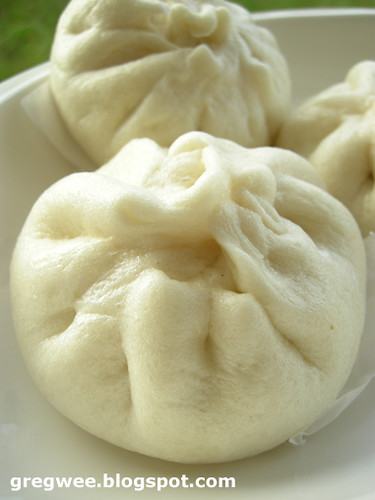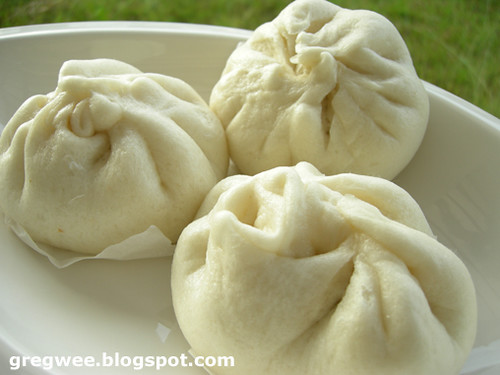
I love making Chinese white paos, and of course eating them as well. The best part is making them over the weekend, then storing them in the fridge, to be steamed up and eaten over the week. It makes morning breakfast much faster and easier, which is equal to waking up slightly later. Yes, you guessed it right, we are not those insane early birds. And I am not about to wake at 5 am to make paos for Greg.
As a standard, there are basically two types of recipes. The first is is the basic dough ones, which is very simple throw everything in and hence, fast. The results are generally good but if compared side by side with type 2, it tends to be tighter in terms of wrapping and bites.

Which ever type it is, there are generally a few standard rules to ensure good paos.
1) Good pao dough will not stick on three things ~ the bowl, the table and your hands. It is soft but not sticky. So definitely it will not stick on teeth when you chew on them.
2) It should be so well kneaded that when you slice through the dough, the inner part is smooth and practically has little or no airholes
3) Good kneading will gives whiter paos. Interesting, isnt it?
4) Do not overproof paos. It does not make it airier but rather it will create wrinkly or pocky faced after steaming.
5) Steam paos on med-hi fire, not high because high heat causes wrinkly surface or pocky face paus.
6) Do not remove steamer from the bottom boiling water or take off the lid immediately. Let paos sit in steamer at low fire for 1 min, remove steamer from hot water and let it sit on a edited: I think it is better to sit over say an wire mesh cake stand or on top of the sink (for cold air from bottom to flow upwards, pushing the hot air out) for 30 secs before removing the lid. This step will help in having smooth surface pao. The concept is we dont want a sudden difference in temperature.
Type 1: Basic Quick Pao Dough
500gm of good quality superwhite pao flour
100gm of icing sugar
50 gm of shortening/crisco
2 teasp of instant yeast
230-250 gm of room temperature water
1) Place sifted flour with sugar and yeast in a mixing bowl. With a dough beater, turn on low and mix the dry.
2) Add water, followed by shortening. Mix until all ingredients come together into a smooth dough that does not stick onto the bowl. I would generally hand knead (motion of washing clothes) as I go along. Using a dough cutter, cut and check cut surface. Dough is only ready if the surface is very smooth. Rest cover for 15 min.
3) Divide into equal balls and roll each balls into a small round smooth dough. If you are making a small recipe (say 1/2 of the above recipe), the balls at this stage should rest for 10 min. But if you make this quantity, by the time you shape the last ball, the first ball should be well rested already. You can proceed with wrapping the first ball.
4) Start wrapping and shaping with filling. Rest for another 10-15 min (depending on how fast you can wrap a tray of pao for steaming. If you are very slow, then rest for 10 min only. otherwise the first paos will be rested too long). Steam as per Rule 4 and 5.
18 comments:
Nice BAO, man.
Moon Cake fest coming up.
Any recipe for that?
Cheers.
thanks.
This year planning to skip doing mooncakes because i really had not found a good recipe to make my own lotus and red bean paste. i have a good recipe for both the baked skin and snowskin but not the paste. and i hate buying outside paste which i did last year.. if i changed my mind will let you know. hehe...
Thanks so much for sharing! I have tried many of your recipes - butter cakes, roasted pork, pineapple rice, baked potatoes ... and without fail!
And I know I am going to try this recipe soon!
aiyooo..yan tq so much. you really made my day. it is really good to know that you tried and they worked out. i am always worry till sometimes change my recipes many times to make sure they are really good.
Thank you for sharing the info. i am just so glad.
Hi,
Ooh, looks great! This and all your other yummy looking food.
Will you be posting recipe for Type 2 dough? Also, is shortening/crisco absolutely necessary? Is there an alternative? I am trying to stay away from trans fat as far as possible. Thanks!!!
will see how for type 2. i like it myself but it is a lot more work.
some fats is a must. traditionally if i am not wrong ppl use lard. now shortening. crisco is a better quality shortening. there is really no much others besides lard. Butter or oil can try but the effects will be completely different i think.
Thanks! I saw some recipes using lard for those traditional white country breads (i think Ms Nigella Lawson use it for her bread as well). It's a hassle to "cook" lard just for this though. Recent studies are now saying lard is better than shortening, as trans fat does more harm. Guess it's all back to basics now.
Anyway, when you have time, hope you'll share Type 2 with us.
Hi,
How long do we need to steam the paos? 10 or 15 mins? thanks.
if the inner big is cooked then ten min only. if the filling is uncooked, 12-15 min.
Hi Nee,
I've used other recipes which is also like yours the fast type and they include baking powder. Yours doesn't need any baking powder, is it? Thanks again.
Dear Nee,
Love your blog... can you clarify good quality superwhite pao flour? Can I use all-purpose flour? I'm in Melbourne currently..
Thankyou
Leen
HI DELIA
THERE ARE MANY RECIPES WITH BAKING POWDER MINE TOO IN THE FIRST PLACE BUT I FIND THAT USING BAKING POWDER IF NOT WELL MIX GIVE SPOTS ON THE POA AND IT push the rISE too SUDDEN WHEN STEAMING AND ONCE OFF THE FIRE IT BECOMES WRINKLY. YEAST IS ENOUGH OF A RISING AGENT. so i omitted bp.
Hi Leen, poa flour are usually bleached flour to give it a white texture. superwhite is basically those well bleached ones, which certain brands does better. you can substitute with hongkong flour or cake flour or flour that is low gluten. or if you check out in chinese shops, sometimes in comes in boxes that says white poa flour. china town should have them. all purpose is basically medium gluten or plain flour. you may find it a little tight to roll causing wrapping to be tight and you end up with not so smooth surface. Besides the results may tend towards tighter paus instead of fluffy.
Hi Leen, poa flour are usually bleached flour to give it a white texture. superwhite is basically those well bleached ones, which certain brands does better. you can substitute with hongkong flour or cake flour or flour that is low gluten. or if you check out in chinese shops, sometimes in comes in boxes that says white poa flour. china town should have them. all purpose is basically medium gluten or plain flour. you may find it a little tight to roll causing wrapping to be tight and you end up with not so smooth surface. Besides the results may tend towards tighter paus instead of fluffy.
Hi,
How many pao did you make with 500g of pao flour?
Thanks n regards
sorry i kinda overlook this comment. 500gm if i remember correctly i normally make about 12 to 15 depending on how heavy is each ball. 65gm each will give pretty big paos after steaming. 45 to 50gm are generally quite normal. take the whole dough and weigh them then divide accordingly to minimise wastage.
Hi
I saw someone asking for healthier alternative to lard/CRISCO for the bao recipe. I use 3 tablespoons of corn oil for 500g of flour and my baos have already turned out good. I also try to substitute about 30% of the white flour with wholemeal flour, to make it even healthier. I pack the baos in lunch boxes for my kidz to bring to school and they love it.
Hi
I saw someone asking for healthier alternative to lard/CRISCO for the bao recipe. I use 3 tablespoons of corn oil for 500g of flour and my baos have already turned out good. I also try to substitute about 30% of the white flour with wholemeal flour, to make it even healthier. I pack the baos in lunch boxes for my kidz to bring to school and they love it.
Thanks for sharing SY. lard and crisco give a silker smoother texture to poas. sort of making it more refined. using oil will prob give tighter poas and a little yellowing tinge but if you are not particular about the texture which some ppl are, then it is fine. anyway, it is always better to be healther. cheers.
Post a Comment